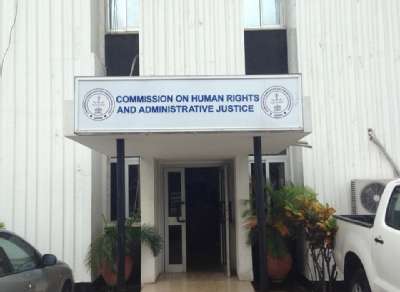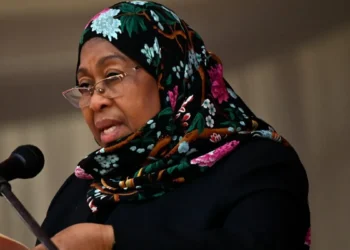As Ghana joins the world to mark the International Day in Support of Victims of Torture, the Commission on Human Rights and Administrative Justice (CHRAJ) has reiterated its stance against all forms of torture, urging the state to fulfil its legal obligations to protect the dignity and rights of all individuals.
In a statement signed by Commissioner Dr. Joseph Whittal, CHRAJ emphasized the significance of the global commemoration, describing it as an opportunity to reflect on Ghana’s responsibility to uphold human dignity in line with national laws and international treaties.
“The Commission remains concerned about the continued existence of practices that violate the rights of individuals, particularly those in detention and persons with mental health conditions.
“The country’s detention facilities continue to face significant overcrowding, with the total prison population reaching 14,206 in May 2025, reflecting an overcrowding rate of 38.39%.”
Commission on Human Rights and Administrative Justice (CHRAJ)
CHRAJ offered a grim assessment of life behind bars in Ghana, pointing to harsh and degrading conditions faced by inmates.
The Commission highlighted issues such as poor ventilation, inadequate toilet facilities, low-quality nutrition, and limited access to medical care—factors that severely compromise inmates’ health, dignity, and right to humane treatment.
It also expressed deep concern over the ongoing abuse of individuals with mental health conditions, particularly in spiritual healing centres.

Although Ghana’s Mental Health Act of 2012 prohibits inhumane treatment, CHRAJ reported that the chaining of people in prayer camps remains a widespread practice.
According to CHRAJ, “individuals with psychosocial disabilities are chained or confined in small cages in multiple facilities, often enduring these conditions for extended periods.”
These practices persist largely because the Visiting Committees and Mental Health Tribunals, mandated under the Mental Health Act, are not functional. The Commission attributed this failure to “inadequate funding and institutional support.”
CHRAJ Condemns Police, Military Brutality
CHRAJ also voiced serious concern about recurring incidents of police and military brutality across the country.
It pointed to the excessive use of force by security personnel during public protests and demonstrations, often justified by perceived threats to public safety.
According to the Commission, such actions violate key principles of proportionality and accountability in law enforcement.
A significant number of these cases remain inadequately investigated, contributing to a growing erosion of public trust in the justice system and security agencies.
“The Commission, however, acknowledges commendable efforts by government and other stakeholders to improve conditions and uphold human rights within the justice and correctional systems.”
Commission on Human Rights and Administrative Justice (CHRAJ)
CHRAJ commended the ‘Justice for All Programme’ for its role in easing the burden of pre-trial detention by accelerating court proceedings for remand prisoners.

The Commission also acknowledged progress in expanding the Open Camp Prison System, which offers a more rehabilitative setting for non-violent offenders and contributes to easing overcrowding in prisons.
In terms of human rights education, CHRAJ highlighted its collaboration with civil society organisations to deliver focused training programmes for security personnel, including police and prison officers.
These initiatives are designed to promote rights-based practices within law enforcement and correctional institutions.
Still, the Commission stressed that much more needs to be done. It urged the government to operationalise the Visiting Committees and Mental Health Tribunals by allocating “adequate financial and logistical resources.”
This, CHRAJ insisted, is essential to protect individuals in prayer camps and psychiatric institutions from “cruel and degrading treatment.”
Swift Reforms To End Torture Urged
CHRAJ further called on the government to move swiftly on legislative reforms, emphasizing the need to amend the Commission’s governing law, Act 456.
The proposed changes would enable the creation, structure, and operation of a National Preventive Mechanism (NPM) in alignment with the Optional Protocol to the Convention against Torture (OPCAT), which Ghana ratified in 2006.
Additionally, the Commission called on the government to ratify the Second Optional Protocol to the International Covenant on Civil and Political Rights (ICCPR), which aims to abolish the death penalty.

“This step aligns with Ghana’s commitment made during its fourth cycle Universal Periodic Review (UPR). The death sentence, which is regarded as one of the worst forms of mental torture inflicted on convicts, should not be allowed to continue to form part of our criminal justice system.”
Commission on Human Rights and Administrative Justice (CHRAJ)
CHRAJ underscored that the United Nations International Day in Support of Victims of Torture is held each year on June 26, following the adoption of UN General Assembly Resolution 52/149 in 1997.
The occasion marks the enforcement of the UN Convention against Torture in 1987 and serves as a global reminder for governments, civil society, and individuals to come together in solidarity with victims and survivors, while renewing their commitment to ending torture in all its forms.
CHRAJ concluded by reaffirming its commitment to the protection of fundamental freedoms. “CHRAJ remains resolute in its constitutional mandate to promote and protect fundamental human rights and freedoms.”
It pledged continued support for all survivors and victims, and called for “greater action to eliminate torture and uphold the rule of law in Ghana.”
READ ALSO: PURC Increases Electricity Tariffs by 2.45%, Holds Water Rates Steady



















